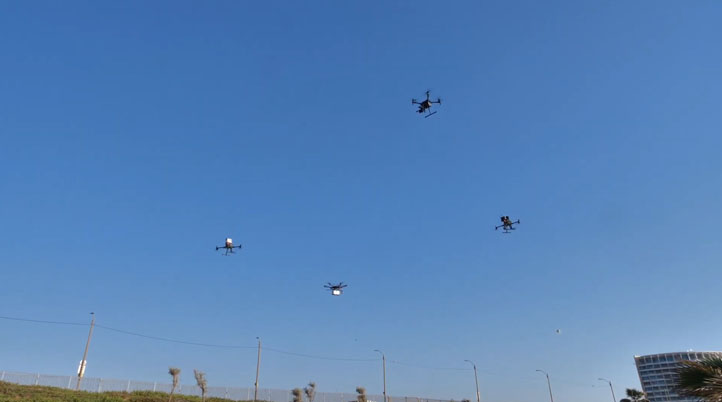While at the forefront of military and commercial drone technology, Israel’s airspace is still limited with strict control, restricted commercial flying zones, and no flying zones along its border. Even though there are many successful Israeli drone companies, the ecosystem is still tilted toward security applications due to the lack of economic incentives to test and develop civil applications, limiting dense airspace for testing opportunities, and the lack of supporting regulation.
Israel’s population of 9.3 million people is largely packed in urban centers, with major cities like Tel Aviv and Jerusalem suffering from high levels of road congestion. According to Eyal Bilia, Ayalon Highways Acting Vice President of Technology and Innovation, “research has found that 20% of the congestion problems in city centers stem from the movement of small goods.” Therefore, drones can assist in two ways – through monitoring and analysis, and the operational aspect of creating new transportation lanes that will ease the existing congestion while building regulations to support ongoing operations in general areas of urban transportation.
In the wake of COVID-19 and its halting effect on the transportation of medical supplies in early 2020, Israel launched the National Drone Initiative, formerly known as NAAMA Initiative, together with Israel Innovation Authority, Civil Aviation Authority of Israel (CAAI), Centre for the 4th Industrial Revolution Israel (C4IR), the Ministry of Transportation of Israel, Ayalon Highways, the Fuel Choices, and the Smart Mobility Initiative. With a total of eight demonstrations every quarter between March 2021 to 2023, the initiative aims to create a national drone network for commercial delivery, medical transport, and urban air mobility, while allowing for agile regulation of UAS, thereby supporting the local ecosystem.
To pave the way for future operations of commercial fleets of delivery drones from a large number of companies in Israel, the Initiative’s first demonstration in March 2021 filled Israel’s skies with delivery drones making 300 flights per day in agricultural areas around Hadera, a city near the coast between Tel Aviv and Haifa. At any one time, there were 20 drones from five different companies flying no higher than 400 feet above the ground, with a required spacing of at least 200 feet between each other, simulating the execution of various types of tasks and operations, including food, medicine, and medical equipment delivery, as well as agricultural services. The end goal of this test was to see how different manufacturers communicate with one another for safe flights, where participating companies shared information in real-time using a central, managed database to maintain full coordination between flights, and ensure drones didn’t get too close to one another.
Moving away from the agricultural areas around Hadera, the second demonstration conducted and tested flights in residential areas and over residents in the northern town of Hadera. With flights being carried out over residential neighborhoods, this demonstration simulated end-to-end drone deliveries, from the moment the order was placed via an app, up to and including the delivery of the goods to the customer. This was “a major step toward the consumer world and the consumer market,” said Daniella Partem, head of C4IR at the Innovation Authority, at the time. “What we are seeing is very exciting. Drones flying in residential neighborhoods, over homes, malls, schools, buildings, and so on. We are looking to create a national drone network, an ecosystem for the delivery of goods, for the public good, in a market that will make the cost of deliveries more competitive.”
The third demonstration saw drones flying on the same Israeli-controlled system, both in and around Tel Aviv, Ramat Hasharon, Herzliya, and Hadera, and a parallel transport flight in Sao Paulo, Brazil. “We had 700 test flights at the start of this year and now we are close to 9,000 flights,” Parlem said during the third demonstration.
“Our vision is to enable 24/7 drone operation,” explained Eden Attias, Chairman at SkylinX, one of the participating companies. “We are developing the needed workflow to support enterprises, cities, and government entities to adopt drones into their day-to-day operations. The current commercial collaboration is just a glimpse into the near future – the massive use of flying robots that will serve organizations and people.”
In December 2021, Israel started the fourth demonstration, where flights took place day and night above Gush Dan and Yeruham. This trial focused on additional missions and challenges, as well as expanding the operational envelope and the potential civilian uses of drone technology to integrate the use of drones in routine activities, such as transportation of basic products, first aid, or deploying a drone attached to a vehicle for real-time monitoring of traffic movement with AI-based elements that can provide forecasts, and more. By launching the fourth phase of the drone initiative, authorities were able to test and perfect operational systems required to manage traffic and gain the experience and insight regulators need to draw up appropriate rules.
“The State of Israel is the most advanced state in the world when it comes to practically examining the anticipated architecture of control in unmanned airspace (U-Space) – which is being examined considering the new European regulations published by the European Union Aviation Safety Agency (EASA),” Joel Feldschuh, Director of the Civil Aviation Authority, stated. “The CAA is adjusting these large pilot testings in accordance with the future legislative outline, and in so doing is preparing and 'ripening' the Israeli market – both so that Israel will be ready for urban drone deliveries, and that drone companies will be able to move forward in the international market, without compromising on the requirements for safe operation for the public and the manned aviation field.”
While the fifth demonstration hasn’t been announced yet, last month, Israel became the first country worldwide to allow large, high-flying drones in civilian airspace. After a rigorous six-year certification process that included extensive ground and flight tests conducted in line with air navigation rules, airworthiness basis, and aviation standards regulated by the International Civil Aviation Organization (ICAO), Elbit Systems’ Hermes Starline UAS follows NATO standardization requirements and is now CAAI’s certified. Therefore, the drone is now allowed to fly at medium altitudes for a multitude of long-range missions, such as securing mass public events, environmental inspection missions, precision agriculture work, maritime search-and-rescue, as well as border security, and anti-terror operations.
On another note, CAAI recently announced drone-in-a-box solutions provider Percepto can now operate its drones BVLOS at three industrial sites in Israel, including one owned by the national water company, Mekorot. So, Percepto’s Israeli customers can now use their drones from a remote location without BVLOS-certified observers on the site, something that was created for operators of military drones only and is extremely challenging to obtain. However, Percepto has continually proven how its unique solution provides safety and efficiency in a well-delivered package.
Apart from Percepto, Israel has a wide list of successful drone software and hardware developers and manufacturers, as well as service providers. For example, Tel Aviv-based Flytrex is a provider of cloud-based on-demand drone delivery services in the US. Currently operating at Holly Springs, Raeford, and Fayetteville, North Carolina, Flytrex drones are completely autonomous and don’t require anyone to fly them or drop off the package. As an extra safety measure, the company has a team of FAA-certified drone operators overseeing each mission and ensuring a seamless delivery.
Based in Herzliya, SeeTree wants to make the most out of every tree with its "Intelligence Platform for Trees,” designed for growers to easily track trees’ health and productivity. By providing per-tree data collected from drones, satellites, IoT sensors, weather information, and more, SeeTree promises its users lower farming operation costs, precise inventory and budget management, as well as smart marketing and pricing.
Also in Herzliya, vHive is the “only software solution that enables enterprises to deploy autonomous hives of drones to digitize their assets and generate digital twins,” Co-Founder and CEO Yariv Geller told Commercial UAV News last year.
As “a construction first, high-tech company”, Nazareth-based Datumate develops innovative solutions for the construction industry, offering software and services that utilize big data analytics, AI and machine learning, state-of-the-art computer vision, and drone and camera technologies. According to the company, digitizing and automating monitoring, data analysis, and reporting processes reduces direct professional costs by 20%, for savings of up to 5% of overall project execution costs, and doubles project profitability.
Finally, one of the more unique use cases comes from Gedera-based Tevel, a service provider that wants to revolutionize fruit harvesting. Its patented platform of Flying Autonomous Robots (FAR) combines cutting-edge algorithms, AI, and data analytics to select and pick only ripe fruit ready for market, day and night, without human intervention. With the help of an app, users can select how many acres and which type of fruit they need to harvest and how many FAR units they need, and Tevel will send a team to execute the operation.
Israel’s National Drone Initiative isn’t only about opening doors for the future of drone delivery and urban air mobility. With every successful demonstration, Israel not only pushes for the ease of drone regulations and their incorporation in our day-to-day lives but also opens opportunities for every company worldwide to further develop and expand their products and services. With four demonstrations left until 2023, it shouldn’t be long before we see more advancements like the ones mentioned above.
Interested in learning more about commercial drones’ international impact? Join the global drone community at Commercial UAV Expo.
Commercial UAV Expo is the definitive global event for professionals integrating or operating commercial UAS. With top-notch education, thousands of attendees, and more exhibitors than any other commercial drone event, it’s the best opportunity of the year for anyone who needs to keep up with commercial UAS technology, trends, and developments. The 2022 event currently boasts more than 300 media and association supporters from six continents.
Countries represented at the event are far-reaching and represent the global breadth of the commercial UAV industry, including a Korea Pavilion, a Czech Republic Pavilion, and attendees and exhibitors from Australia, Austria, Belgium, Canada, China, Finland, France, Germany, Ghana, India, Indonesia, Israel, Japan, Latvia, Mexico, Morocco, Norway, Slovakia, South Africa, South Korea, Switzerland, Thailand, The Netherlands, Turkey, Ukraine, United Kingdom, Uruguay, United States and Vietnam and more!
Registration is now open - click here to register today.















Comments